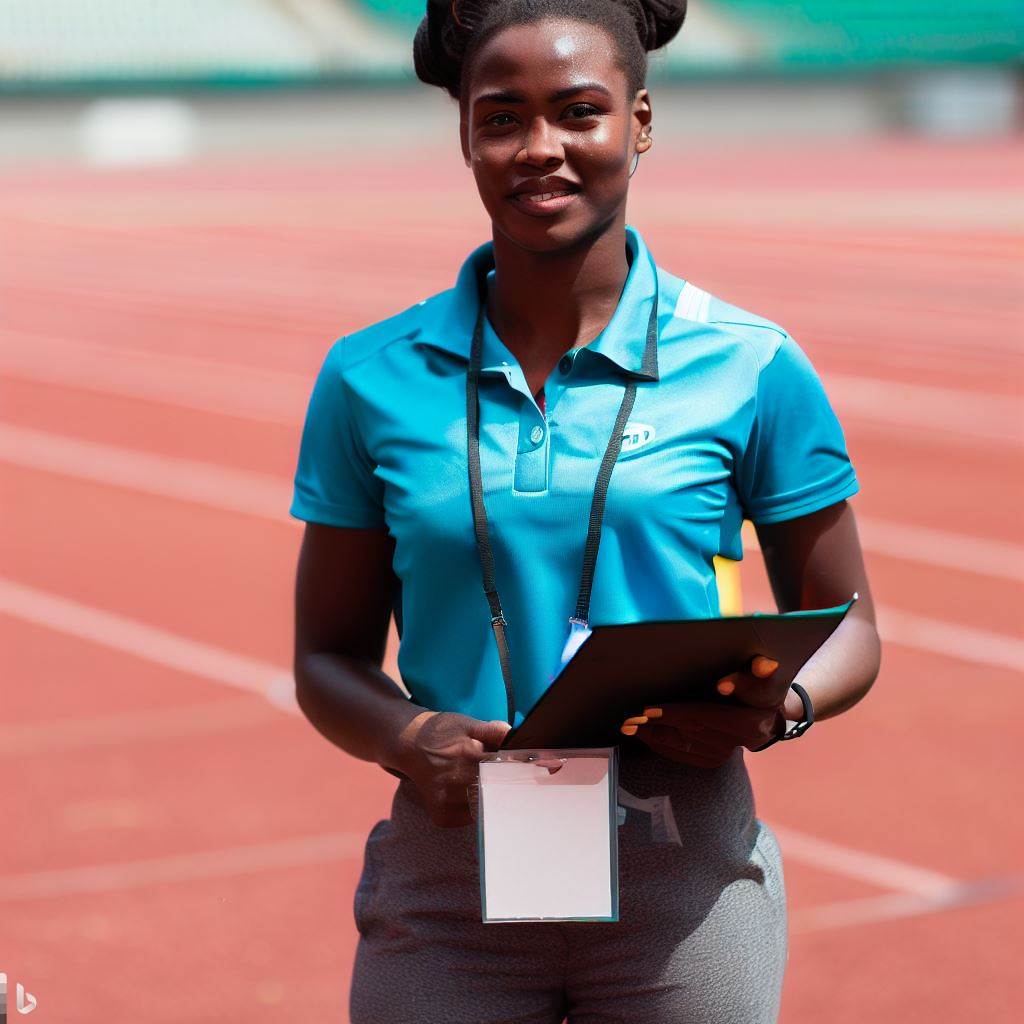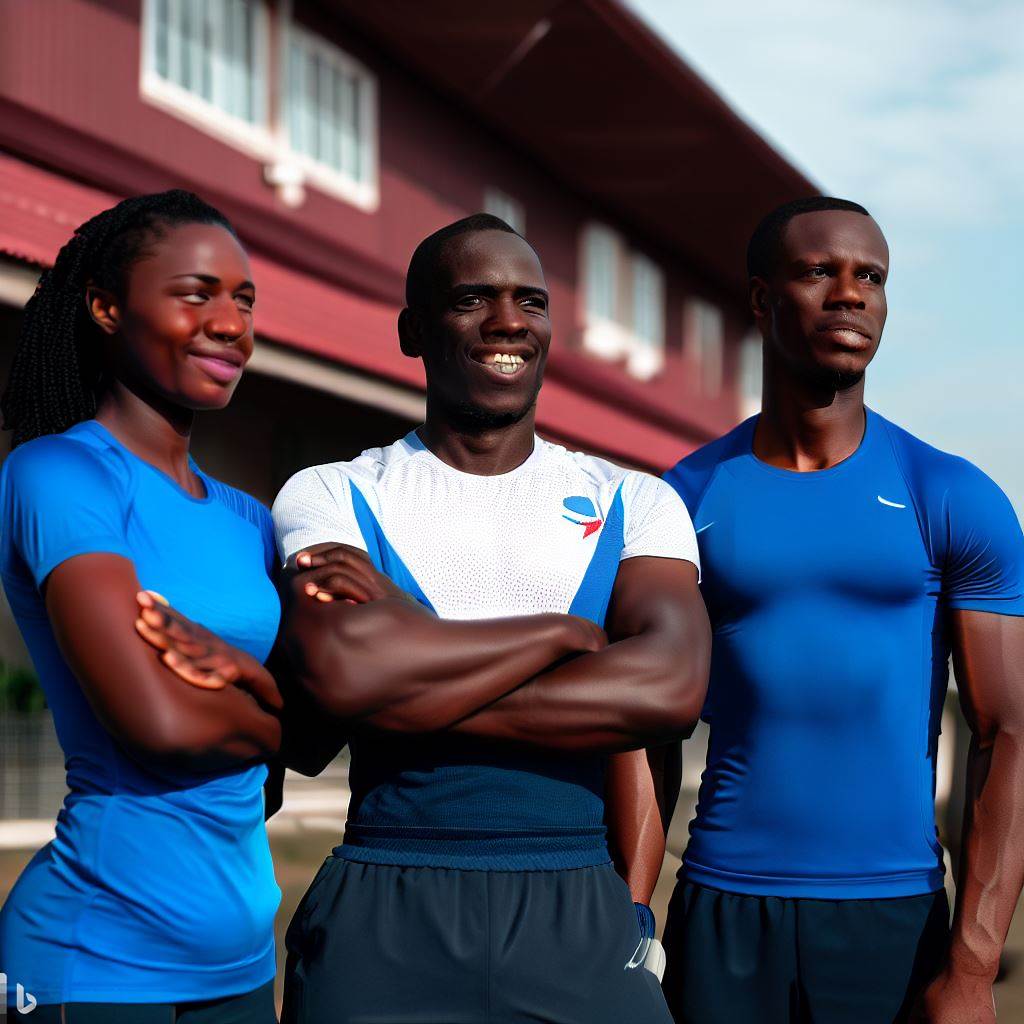Introduction
In the exciting world of Nigerian sports journalism, there’s a growing demand for passionate individuals who can capture the spirit of the game. As we delve into the art of becoming a sports journalist in Nigeria, we’ll uncover the steps and skills needed to succeed in this dynamic field.
Sports journalism isn’t just about reporting scores; it’s about weaving captivating narratives that bring the game to life. In a nation where sports hold a special place in the hearts of many, the role of a sports journalist is more crucial than ever.
From covering thrilling football matches to diving into the heart of athletic competitions, a sports journalist’s journey is an adventure in itself. This blog post will serve as your guide through the twists and turns of this exhilarating career path.
Whether you dream of interviewing your favorite athletes, reporting from the frontlines of major sporting events, or analyzing game strategies, this guide will equip you with the knowledge and insights you need.
So, fasten your seatbelts, and get ready to explore the world of sports journalism in Nigeria. We’ll navigate through the educational requirements, the art of storytelling, the importance of networking, and the tools of the trade that will set you on the path to becoming a successful sports journalist in Nigeria.
Understanding the Role of a Sports Journalist
Define the role of a sports journalist and its significance in the field of sports
- A sports journalist is responsible for reporting, analyzing, and providing insights on sports-related news.
- They play a crucial role in delivering accurate and unbiased information to sports enthusiasts.
- Sports journalists contribute to the development and growth of the sports industry.
- They provide a platform for athletes and teams to share their stories and achievements with the public.
- The role of a sports journalist is significant as they bridge the gap between athletes and fans.
Highlight the responsibilities and skills required to become a successful sports journalist
- Stay updated on sports news, developments, and trends to provide accurate and timely reports.
- Develop excellent writing skills to effectively convey information and engage readers.
- Conduct thorough research to gather facts and statistics for in-depth sports coverage.
- Possess good interviewing skills to extract valuable insights and quotes from athletes and sports personalities.
- Have a strong knowledge of sports rules, strategies, and terminology to provide insightful analysis.
- Adapt to new technologies and social media platforms to reach a wider audience.
- Maintain journalistic ethics by reporting truthfully and remaining unbiased.
- Work well under pressure and meet deadlines, especially during live events.
- Develop networking skills to build relationships with athletes, coaches, and other industry professionals.
- Be passionate about sports and have a genuine interest in all aspects of the sports industry.
A successful sports journalist possesses a combination of skills, including writing, research, interviewing, and industry knowledge.
They must stay informed about the latest news, deliver accurate reports, and provide analysis that adds value to the sports community.
It is vital to maintain professionalism and integrity while engaging with athletes, coaches, and fans. Adaptability to technological advancements and social media platforms is also crucial in today’s digital age.
By understanding the role and responsibilities of a sports journalist, aspiring sports journalists can develop the necessary skills and knowledge to excel in this field.
With determination, passion, and continuous learning, one can become a successful sports journalist in Nigeria.
Read: Navigating the Nigerian Sports Industry: A Guide
Educational Background and Qualifications
Discuss the importance of pursuing a degree in journalism or related field
Earning a degree in journalism or a related field is crucial for aspiring sports journalists.
- Enhances knowledge: A degree program provides a comprehensive understanding of journalism principles, ethics, and practices.
- Develops core skills: Students gain essential skills like writing, researching, interviewing, and storytelling.
- Builds credibility: Employers value candidates with a formal education, as it demonstrates dedication and competence.
- Expands network: College allows interactions with professors, peers, and industry professionals, facilitating invaluable connections.
Outline the specific courses or areas of study that are beneficial for aspiring sports journalists
- Journalism Ethics: Understanding ethical guidelines is vital, ensuring fair and unbiased reporting.
- News Writing: Developing strong writing skills helps convey information effectively.
- Broadcast Journalism: Learning the techniques of TV and radio reporting is valuable for versatile sports journalists.
- Sports Writing: Specialized courses focus on the fundamentals of sports reporting, including analysis and commentary.
- Media Law: Familiarity with legal regulations ensures journalists adhere to ethical practices and avoid legal complications.
- Multiplatform Journalism: Learning how to leverage various media platforms, including online and social media, is essential.
- Sports Management: Gaining knowledge of the business side of sports provides a deeper understanding of the industry.
- Data Journalism: Embracing data analysis and visualization techniques helps journalists provide in-depth sports coverage.
- Internship Opportunities: Real-world experience through internships allows students to apply their skills in professional settings.
- Relevant Electives: Taking courses in subjects like sports psychology, sports marketing, or sports sociology can provide additional insights.
In essence, pursuing a degree in journalism or a related field is crucial for those aspiring to become sports journalists in Nigeria.
The education gained through a degree program enhances knowledge, develops core skills, builds credibility, and expands networks.
Specific courses like journalism ethics, news writing, and broadcast journalism, along with elective courses and internships, further equip aspiring sports journalists with the necessary skills and knowledge.
By investing in their education, aspiring sports journalists can increase their chances of success in this competitive field.
Read: Future Prospects for Nigeria’s Athletics Industry
Gaining Practical Experience
Explain the significance of gaining hands-on experience in the field
Hands-on experience is crucial in becoming a successful sports journalist in Nigeria. It allows aspiring journalists to develop and refine their skills in a real-world setting.
Therefore, practical experience provides an opportunity to apply theoretical knowledge gained through academic studies.
By working in the field, aspiring sports journalists can learn how to work under pressure, meet deadlines, and handle various challenges that may arise.
Practical experience also helps in building a network of professional contacts, which is essential for career advancement in the sports journalism industry in Nigeria.
Provide information on internships, volunteering, or apprenticeships that can assist in building a portfolio
Internships, volunteering, and apprenticeships play a vital role in building a strong portfolio for aspiring sports journalists.
Internships allow individuals to work with professional sports media organizations, gaining valuable experience and exposure to the industry.
Through internships, aspiring journalists can learn from seasoned professionals, observe their work, and receive valuable feedback that aids in personal and professional growth.
Volunteering at local sports events, community sports organizations, or college newspapers can also provide hands-on experience.
Apprenticeships offer another avenue for gaining practical experience. Working alongside experienced sports journalists allows for mentorship and skill development.
During these learning opportunities, individuals can actively contribute to news coverage, conduct interviews, write articles, and create multimedia content.
These experiences help build a diverse portfolio of work that showcases an individual’s skills and abilities.
List of Opportunities to Gain Practical Experience
Internships
- Seek internship opportunities with reputable sports media organizations.
- Apply for internships during summer breaks or academic terms.
- Use online platforms or personal connections to find internship opportunities.
Volunteering
- Offer your services at local sports events, such as marathons or community tournaments.
- Volunteer for sports organizations or college newspapers to gain experience in reporting and writing about sports.
- Approach local sports clubs or teams and offer to contribute content for their websites or social media platforms.
Apprenticeships
- Look for apprenticeship programs run by sports media organizations or individual journalists.
- Reach out to experienced sports journalists and express your interest in learning from them.
- Develop a strong relationship with a mentor who can guide you through the industry.
In review, gaining practical experience is vital for aspiring sports journalists in Nigeria.
It provides an opportunity to apply theoretical knowledge, develop essential skills, and build a network within the industry. Internships, volunteering, and apprenticeships are effective ways to gain hands-on experience and build a strong portfolio.
By actively seeking these opportunities, aspiring sports journalists can enhance their chances of success in this competitive field.
Read: Exploring Nigeria’s Sports Talent Development Programs
Developing Writing and Reporting Skills
Emphasize the importance of excellent writing and reporting skills
- Strong writing and reporting skills are essential for success as a sports journalist in Nigeria.
- These skills allow you to effectively communicate with your readers and deliver accurate information.
- Journalists with exceptional writing and reporting abilities are highly sought after in the industry.
- They can secure better job opportunities and establish themselves as credible and trustworthy professionals.
Suggest ways to improve writing and reporting abilities such as practice, workshops, and mentorship
- Practice writing regularly to develop your skills and improve your fluency.
- Set aside dedicated time each day to write about various sports topics.
- Challenge yourself with different writing styles and genres to broaden your abilities.
- Attend workshops and training sessions focused on journalism and reporting.
- These events provide valuable insights and techniques to enhance your writing and reporting skills.
- Network with experienced sports journalists who can serve as mentors.
- Seek their guidance and feedback on your work to refine your abilities further.
- Read extensively to expose yourself to different writing styles and learn from accomplished writers.
- Study the works of renowned sports journalists to understand their approach and techniques.
- Keep yourself updated with the latest developments in the sports industry.
- Follow reputable sports news sources and analyze their reporting techniques.
- Learn from their effective storytelling and incorporate their strategies into your own work.
- Join writing groups or communities where you can receive constructive criticism and feedback.
- Engage in writing exercises and receive input from fellow aspiring sports journalists.
- Utilize online resources and platforms that offer writing courses and tips for aspiring journalists.
- Take advantage of these resources to enhance your writing style and improve your reporting skills.
- Develop a habit of proofreading and editing your work thoroughly before publishing or submitting.
- Ensure clarity, precision, and accuracy in your writing to provide reliable information to your readers.
By continuously honing your writing and reporting skills, you can elevate your career as a sports journalist in Nigeria. Remember that practice, workshops, and mentorship are crucial components of professional growth in this field.
Read: The Rise of Nigerian Athletes on the Global Stage

Networking and Building Connections
Describe the value of networking in the sports journalism industry
- Networking is crucial in the sports journalism industry as it helps create opportunities for career advancement.
- Building connections with industry professionals can lead to mentorship and guidance for aspiring sports journalists.
- Networking provides access to insider information and exclusive opportunities for interviews and coverage.
- Creating a network of contacts allows sports journalists to stay updated with the latest trends and developments in the field.
- Networking helps establish credibility and reputation within the industry, opening doors for future collaborations and partnerships.
Provide tips on how to build professional connections through networking events or social media
- Attend industry conferences, seminars, and workshops to meet fellow sports journalists and industry experts.
- Active participation in these events by asking insightful questions and sharing knowledge can leave a lasting impression.
- Utilize social media platforms like Twitter and LinkedIn to connect with sports journalists, editors, and media organizations.
- Engage in online discussions, share relevant content, and interact with industry professionals to showcase expertise and build connections.
- Join professional associations or organizations specifically for sports journalists to connect with like-minded individuals.
- Attend sports events and press conferences to network with athletes, coaches, and other sports industry stakeholders.
- Be proactive in reaching out to individuals for informational interviews or shadowing opportunities.
- Follow up with people after networking events or online connections through emails or LinkedIn messages.
- Offer help or support to others in the industry to build mutually beneficial professional relationships.
- Maintain a professional online presence by curating and sharing industry-related content on social media.
- Always be prepared with business cards and a concise elevator pitch to introduce yourself and make a memorable impression.
- Build rapport with journalists and editors by providing well-researched story pitches and contributing to their work.
Networking is the backbone of the sports journalism industry, providing numerous opportunities and connections that can propel one’s career forward.
By actively participating in networking events, leveraging social media platforms, and building professional relationships, aspiring sports journalists in Nigeria can unlock doors to success.
Specializing in Sports Coverage
Advantages of specializing in a specific sport or area of sports coverage
- Expertise: Focusing on a particular sport allows journalists to become experts in that field, enhancing their credibility and knowledge.
- Deep understanding: Specialization enables journalists to gain in-depth knowledge of the sport, including its rules, history, and players.
- Unique perspective: By specializing, journalists can offer a unique perspective and analysis, providing valuable insights to their audience.
- Establishing connections: Focusing on a specific sport allows journalists to build strong relationships with players, coaches, and stakeholders, which can lead to exclusive interviews and stories.
- Branding and recognition: Specialization helps journalists develop a distinct brand and become recognized as authorities in their chosen sports.
Opportunities and challenges in covering specific sports in Nigeria
Football (Soccer)
- Nigeria boasts a massive football fan base, offering journalists a broad audience.
- Journalists can cover domestic and international football events due to the sport’s global appeal.
- They have access to top players in local and foreign leagues, providing exclusive insights.
- High competition within Nigerian football coverage poses challenges.
- Journalists may face issues of corruption, bias, and favoritism within the football industry.
- Safety risks can arise during intense rivalries and high-stakes matches.
Athletics
- Exceptional Nigerian track and field athletes offer compelling coverage opportunities.
- Olympics provide a global stage for reporting on Nigerian athletes’ performances.
- Journalists can discover and promote grassroots athletic talent.
- Limited funding hinders athletics coverage, impacting facilities and athlete support.
- Athletics often receives less media attention compared to football.
- Vigilance is necessary to report potential doping scandals and maintain integrity.
Basketball
- Basketball’s growing popularity in Nigeria offers a expanding fan base.
- Strong NBA connections provide access to exclusive interviews and stories.
- Nigerian basketball players’ international success creates reporting opportunities.
- Inadequate infrastructure and grassroots development hinder basketball coverage.
- Domestic basketball competitions often receive less media attention than international leagues.
- Financial constraints, including travel expenses, can challenge journalists covering basketball.
In summary, specializing in sports journalism in Nigeria presents both advantages and challenges.
While each sport offers unique opportunities, journalists must contend with competition, biases, safety concerns, limited resources, and varying degrees of media attention.
Understanding these dynamics empowers sports journalists to make informed choices and contribute to the field’s advancement in Nigeria.
Gain More Insights: The Role of Women as Sports Information Directors in Nigeria
Adapting to Technological Changes
Discuss the impact of technology on sports journalism
- Technology has revolutionized sports journalism by providing instant access to information and live updates.
- Social media platforms have become crucial tools for journalists to engage with their audience and share news.
- Video streaming platforms allow journalists to broadcast interviews, highlights, and live sports events.
- Data analysis tools and software make it easier for sports journalists to analyze statistics and provide in-depth insights.
- Mobile apps have made it convenient for journalists to access information and publish stories on the go.
Provide tips on staying updated with technological advancements in the field
To thrive in the digital era, Nigerian sports journalists must adapt to technological changes and embrace new opportunities:
- Stay Informed: Follow tech news websites, blogs, and podcasts for the latest developments.
- Attend Workshops and Conferences: Participate in events focused on tech and journalism intersections.
- Engage on Social Media: Connect with peers and professionals to exchange knowledge and stay updated.
- Experiment with Technology: Embrace new tools and platforms to enhance skills and adapt to trends.
- Continuous Learning: Upgrade digital literacy skills to effectively utilize technology in journalism.
Technology has revolutionized sports journalism in Nigeria, offering real-time reporting and interaction with the audience.
Social media platforms like Twitter and Instagram enable instant updates and audience engagement. Video streaming platforms, such as YouTube and Periscope, provide live coverage of sports events.
Data analysis tools enhance in-depth reporting, and mobile apps offer on-the-go publishing.
To stay updated, follow tech news, attend relevant events, engage on social media, experiment with new tools, and prioritize continuous learning.
By doing so, sports journalists can thrive in the digital age, delivering engaging and timely content to their audience.
Overcoming Challenges and Persistence
Address the challenges faced in the sports journalism industry in Nigeria
- Limited job opportunities for sports journalists due to a highly competitive industry.
- Lack of proper infrastructure and resources, such as well-equipped newsrooms and sports facilities.
- Inadequate remuneration and job security, making it difficult to sustain a career in sports journalism.
- The influence of corruption and bias in reporting, which undermines the credibility of sports journalism.
- Limited access to players, coaches, and sporting events, making it challenging to gather accurate information.
- Growing social media presence, leading to a decline in traditional media consumption and job prospects.
- Gender bias and discrimination, making it hard for women to thrive and succeed in the industry.
Encourage aspiring sports journalists to remain persistent and dedicated
- Stay motivated and passionate about sports journalism despite the challenges.
- Develop strong networking skills to create opportunities and build connections in the industry.
- Enhance writing and reporting skills through continuous learning, practice, and feedback.
- Stay updated with the latest sports news and trends, both nationally and globally.
- Seek internships and volunteering opportunities to gain practical experience and showcase abilities.
- Join professional associations and attend sports journalism conferences to expand knowledge and network.
- Embrace new technologies and digital platforms to adapt to the changing landscape of journalism.
- Seek mentorship from experienced sports journalists who can provide guidance and support.
- Develop a unique and personal brand that sets you apart from other aspiring sports journalists.
- Stay persistent, resilient, and determined in the face of setbacks and rejections.
- Be open to exploring different roles and avenues within the sports journalism industry.
- Continuously work on building a strong portfolio and showcasing your best work to potential employers.
- Stay ethical and maintain integrity in reporting by verifying facts and avoiding biased coverage.
- Be willing to start from the bottom and work your way up, gaining valuable experience along the way.
- Remember that success in sports journalism requires patience and a long-term commitment.
By acknowledging the challenges and embracing persistence and dedication, aspiring sports journalists in Nigeria can overcome obstacles and carve a successful career path in this competitive industry.
Conclusion
In general, becoming a sports journalist in Nigeria requires dedication, passion, and a step-by-step approach. Throughout this blog post, we discussed the key points to consider when pursuing this career:
- Developing strong writing skills
- Gaining practical experience through internships and volunteer work
- Building a strong network within the sports industry
- Improving knowledge and understanding of various sports
- Staying up-to-date with current events in the sports world
By following these steps, aspiring sports journalists in Nigeria can increase their chances of success in this competitive field.
It is important to remember that passion for sports journalism will be the driving force behind their journey.
To further assist readers in their pursuit, here are some helpful resources:
- Nigeria Sports Journalists Association
- Nigeria Union of Journalists
- Nigerian Institute of Journalism
By utilizing these resources and continuing to build their skills and network, aspiring sports journalists in Nigeria can turn their passion for sports into a successful career.




